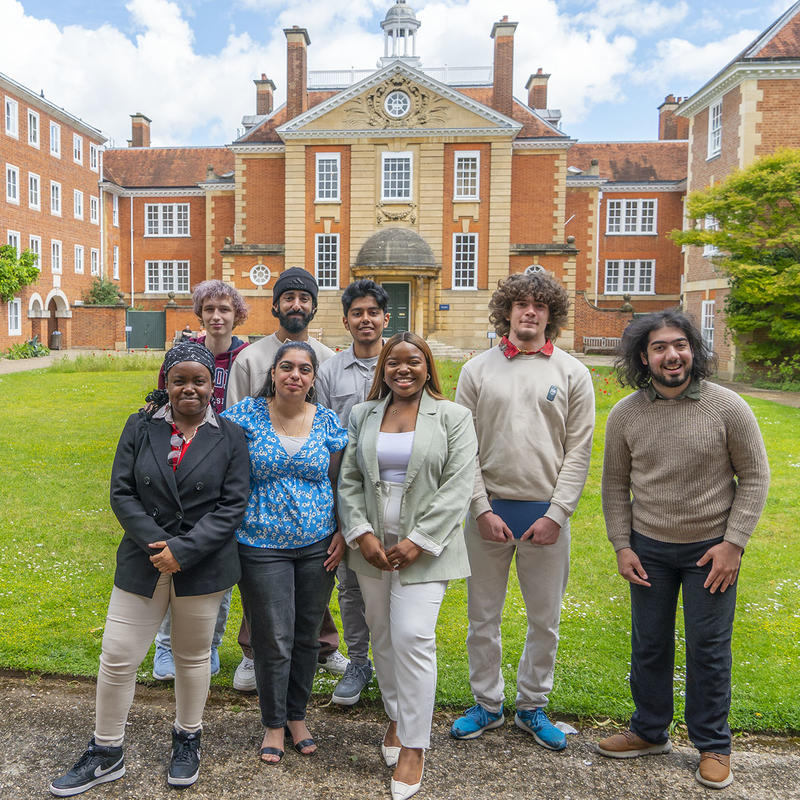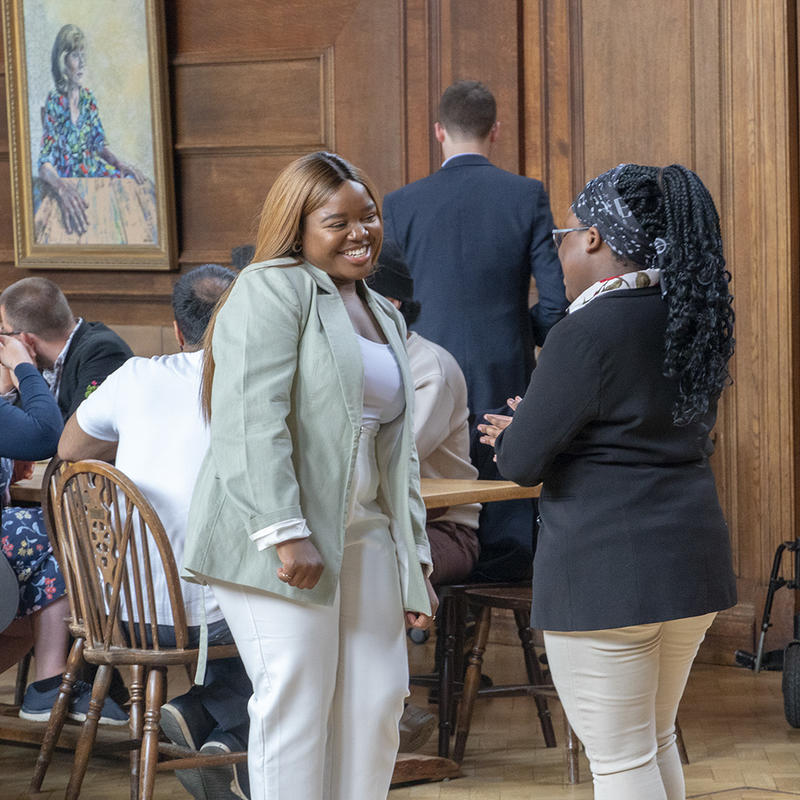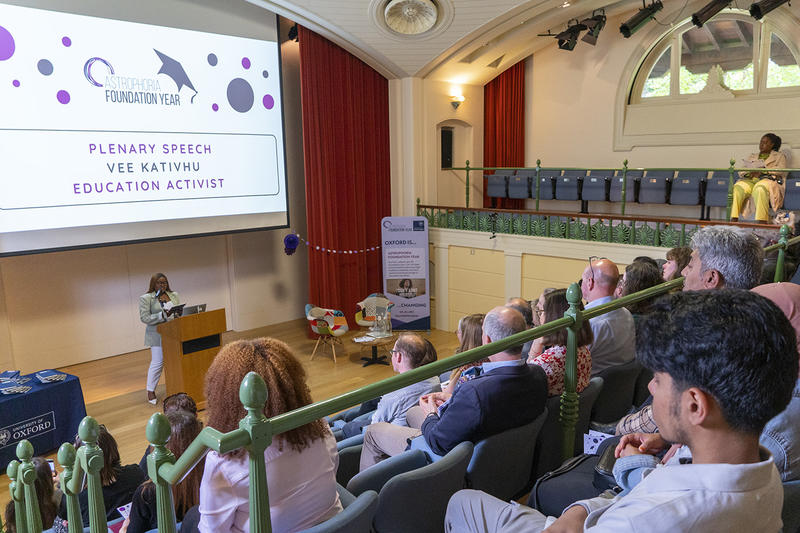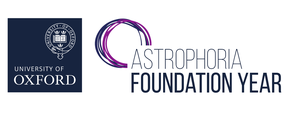Astrophoria scholars interview Vee Kativhu
This article was written by Ghena who has been studying Law on the Astrophoria Foundation Year. She conducted the interview with Vee Kativhu alongside fellow student Bassam who has been studying on the same course.
On Saturday 15 June, the University of Oxford celebrated the end of its first year of the Astrophoria Foundation Year programme. As part of the celebration ceremony, Vee Kativhu gave a plenary speech to the staff, students, families and supporters in attendance. She was also interviewed by two students on the Astrophoria Foundation Year programme.
Vee is an Oxford alumna who took part in the Lady Margaret Hall Foundation Year which started in 2016. This initiative, which took place in one Oxford college, was one of the inspirations for the University of Oxford's expanded Astrophoria Foundation Year programme.
Vee is also a Harvard alumna and is currently doing her PhD at Claremont University. She is a social media influencer and an education activist who uses her social media platforms to share study advice and empower underprivileged and underrepresented young students. She is the founder of Empowered by Vee, an access scheme which aims to inspire students on their academic journey through encouragement and self empowerment.
Vee was featured on the BBC’s 100 Women, a list of inspiring and influential women from around the world for 2023, and was recognised in the Culture and Education section for the impact that her YouTube channel has had on the lives of young people. She has won a Diana Award and is a Young Leader for the United Nations Sustainable Development Goals. She is very inspiring and serves as a role model for many young people and in our meeting with her we learned a lot about how she handles such great responsibility.
Like many, Vee was failed by the education system. She struggled and stumbled upon many obstacles in her academic journey, and as a result, she decided to make a change and help people who have viewed higher education as inaccessible at some point in their lives. We asked her to share some of the challenges she has faced, what has inspired her to become such an empowering personality, and what advice she would give to students who are facing obstacles similar to the ones that she has faced. She had a lot to share with us.


Can you share some of the challenges you have faced within your journey and how you overcame them?
There's been many challenges at different stages of my journey. But I think the most relevant is an experience that happened during my A-levels. I was aspiring to be in a space like Oxford. It was something that I'd dreamt about. In Zimbabwe it's something so prestigious and so cool. So, when I was thinking about where I want to go to school, my mom had Oxford on the tip of her tongue, and so did my aunties and uncles at church.
It just became this thing and I couldn’t see the reason why I couldn't do it. It didn't feel like something out of my reach because I was always studious and someone who loved learning. I thought if I'm passionate about my studies and I'm getting the grades then surely a place at Oxford is attainable.
When I approached my teacher to ask for help with personal statements and references, to have her tell me it's not for you, for someone like us, I think that shattered my world and my worldview because before that moment I had such confidence.
I think that was probably the first time in the UK that I experienced this thing of knowing there are hierarchies here, there are things at play outside of me and me wanting to be there. I think that was the biggest challenge that lives in my mind rent free because it was so pivotal and it kind of catapulted the journey of me becoming an education activist.
I think that's where the fire got lit because I was so angry and so annoyed. I was like ‘But why? Like, why would you not even try for me? You haven't even helped me research or look into it. You just shut it down’. So yeah, I would say that was a catalyst for a lot of things, but also it was something that really hurt me. It was a big challenge I had to overcome mentally more than anything.
Can you tell us about what keeps you inspired and motivated in your journey as an Education Activist? What is something you really look forward to when you're doing this work?
I think for me it's the stories of the people that I meet, the people that I get to know, the stories that live with me. Like the girls I've met in Cambodia and India. I almost carry a piece of them with me wherever I go. It keeps me inspired and motivated. I’m talking about disempowerment in school where a teacher says something like I mentioned, to things like child marriage. Or someone wants to be in school but now they've been married off at 13, and they're seen as a woman and their education has stopped. Or period poverty where someone might have to drop out because they're period comes in, they can't afford menstrual cycle products, and then they miss a month or so and now they're behind. Or things like conflict, wars and religious issues which can mean they are literally not allowed to go to school.
The scope is so wide that what keeps me going is knowing that even if I feel accomplished in one area there's still a long way to go, there's a range of issues. I think knowing that the job is nowhere near done keeps me wanting to do more and just to do my part where I can.
And in the educational space, I can use my voice, use social media and use the connections I have to keep amplifying these stories. I have found peace knowing that that's what my calling is. I can push for things and push it to the people who have the funding, control the policies or whatever it may be.
Who are the people that inspire you?
I love that question. I think for me, number one, it is powerful women in my life who've raised me. They keep me going because looking to my mom, my aunties, my sister, my grandma, they're such phenomenal women who know exactly who they are and they don't stand for any mistreatment. They don’t stand for any nonsense. I think that has helped me be assertive in who I am, whether I'm walking into the German Foreign Office to talk about foreign policy or talking to the Cambodian government I feel the confidence of being able to say, ‘Hey, this is what I think’ and nothing necessarily intimidates me. I think I get nervous sometimes, but I don't necessarily feel intimidated. And it’s because of watching my mom and my aunties operate.
Then I would say iconic people like Michelle Obama, for example, watching how she held that position in office where it could easily have gone in a different direction. But she found her own name, she paved her own path. People tried to be like 'that's Barack Obama's wife'. Like no, that's Michelle Obama in her own right and in her own space. Her advocacy for education made me want to carry on. To see you can have a platform and do work like this, and it doesn't mean you have to be offline, was eye opening. The way that she operated made me think, ‘Oh, it's possible for me to pave my own path’.
I’d also say other young activists are inspiring for me. There are so many in this space who are just killing it and doing amazing things, so I am lucky that I don't have to look far for inspiration. It's in my phone book, you know what I mean? So yeah, I think those are the people that really inspire me.
You often speak about the importance of accessible education. So, what are some of the biggest challenges you've seen in achieving these goals?
I would say that the biggest issue that I see in accessing education on a global level, it doesn’t matter what region of the world I'm in, is funding and resourcing. I've experienced it personally, but not on the scale of what I've witnessed. I've witnessed someone who might not have the $50 needed to sit the exam that could literally change their life. Now I have a different perspective, I'm lucky to be able to put a call out to the world and be like, I need it, and I know someone's going to come back and they're going to have it for me just because of some of the things I've done, some of the people I've met, some of the spaces I've been able to be in. I have access to a network now.
I think for me I would say resourcing is the thing that I've seen on a large scale, on a small scale, whether it's hundreds of thousands needed, or whether it's $100 needed, the scale is wide. Young people around the world, no matter what age, they're calling for funding, and that's one thing that is so limited. No matter what space, whether they are speakers at the UN, or whether they are trying to get access to education, or whether they're trying to build a new charity that's going to help their community, no matter what lens or angle it boils down to resourcing is needed.
Young people are underfunded and under-appreciated. They are are the ones who are shaking the tables and putting on pressure, who are standing up for climate action and putting really important topics on the agenda. Yet they are the ones who are the least valued in my opinion. That's what I would say, because if you're not giving me the money I need, then you don't value the work that I'm doing. We need more bursaries and scholarships. Whatever you want to call it, students need money.
What kind of advice would you give to your younger self or someone in your shoes?
That's a really good question. If I could talk to my 16 year old self I would say that I need to be brave. We talk about having imposter syndrome, and sometimes I think we miss we misrepresent it as if it's something that belongs to the person feeling it. It's like no, this is a kind of manipulation thing where someone makes you think you should feel it, and makes you doubt your place there. But in actuality, you were never supposed to think like that. You outdid it, you earned your place there, you're more than qualified to be there. But now you have to hold this feeling that doesn't belong to you.
I think younger me really took imposter syndrome as if it was a real thing that really belonged to me when actually the university or whatever institution you’re a part of should be working hard time and time again to ask itself, ‘What have we done wrong so that someone like this feels that way in this space?’. And I think my younger self didn't understand that nuance that actually it wasn't my job to fix the issue.
As a role model for many young people how do you handle this responsibility?
With great power comes great responsibility. And to whom much is given, much is expected. So, I think that I handle it with care. I handle it with the knowledge that my words have deep meaning. So I won’t just start going online and spouting anything because I'm aware that once I say it, I don't know what the impact could be. Sometimes it's not just about how things appear to you, it's about what impact it will have on someone else.
I have a responsibility and a duty of care to the people who choose to press that button to follow. It's always in the back of my mind and I think I handle it well. I have a great team around me. I have great people around me who like championing me, checking on my mental health, making sure that I'm also looked after because I think you can't pour if you're running from empty, you have to look after yourself.

As a person who has had her fair share of obstacles to overcome, Vee works every day to ensure that students are inspired and encouraged to do their best. She serves as an empowering role model to young people and her enthusiasm about education is evident throughout her continuous activism.



